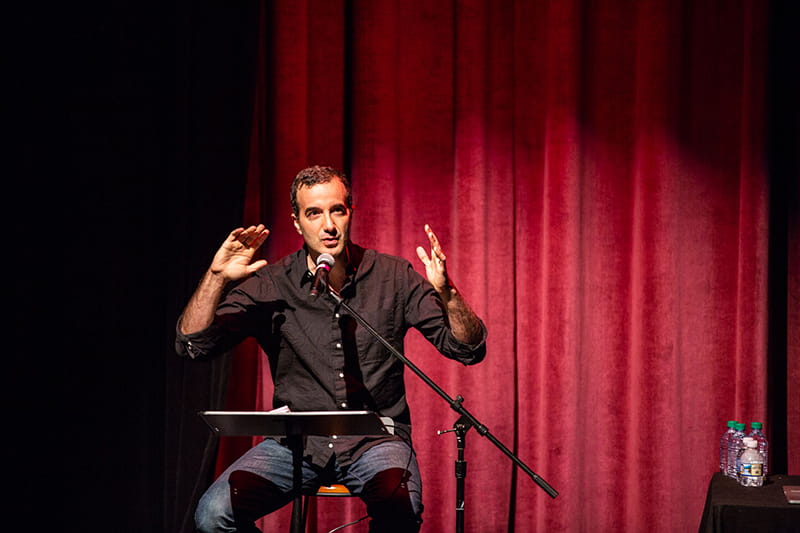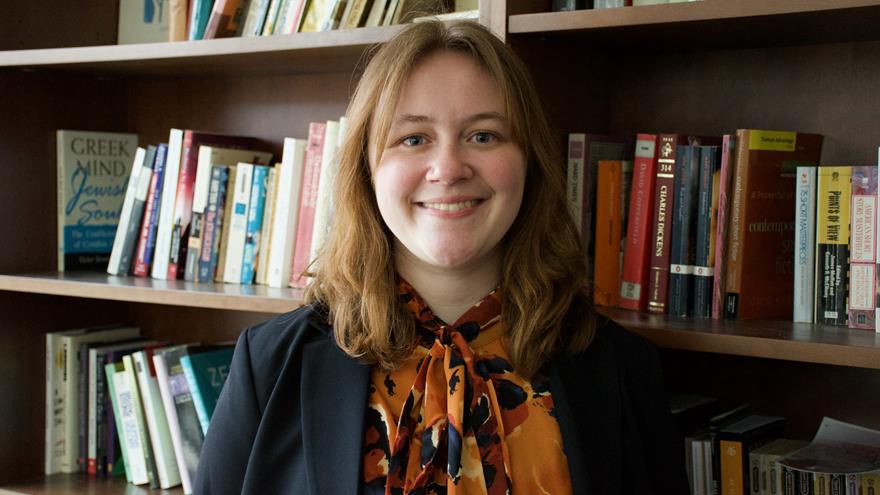Jad Abumrad Shares Creative Mantras With Drexel Audience Through Lecture

The College of Arts and Sciences invited Drexel University students, faculty, staff and the community at large to Mandell Theater on April 25 to see, rather than hear, their favorite podcaster.
Jad Abumrad, creator and co-host of the Peabody Award-winning public radio show “Radiolab,” gave his talk on “The Miracle of Indoor Plumbing”— an immersive lecture accented by audio recordings, music, graphic art, animation and more — as part of the college’s annual Distinguished Lecture Series.
Before the decorated broadcast journalist and composer took the stage to give his lecture, Donna Murasko, PhD, dean of the college, noted the lecture series’ roots in celebrating and stimulating intellectual curiosity. She added that after every past lecture, she left thinking about the topic discussed a little differently, and she expected nothing less from this 8th annual installment.
“It really takes a speaker who understands the material, but more importantly, understands that not everyone has the same perspective, who then can bring out in us the ability to look at something differently, and many times to take home a message that you never thought you would get from that particular presentation,” Murasko said.
Jennifer Yusin, PhD, associate professor of English, while introducing Abumrad also explained how the series was created to promote connections across the humanities, social sciences and sciences, and that Abumrad’s work exemplifies this by pushing beyond the divisions between science and art, and beyond the limits of traditional radio.
“Tonight, and with every lecture, we welcome you to experience how the curious and unconventional ways of exploring life and living produces new knowledge, writes new stories, and creates new ways of dissolving boundaries between disciplines,” Yusin said.
Abumrad then took the stage to explain how this lecture summed up the four things he learned while taking a much-needed hiatus from his radio career in 2017. He admitted that he was a little nervous, as the audience was among the first to hear “this particular set of thoughts.”
“On any given episode, ‘Radiolab’ is maybe the No. 1 or No. 2 most downloaded show on the planet,” Abumrad stated after asking how many in the audience were familiar with “Radiolab” and its spinoff show, “More Perfect” — a question that was met with thunderous applause. “So as a podcast, it’s found an audience which would have been really, really hard to predict. But about a year ago, I sort of hit a wall. That’s really where this talk begins, with a sort of mini-crisis.”
“On any given episode, ‘Radiolab’ is maybe the No. 1 or No. 2 most downloaded show on the planet,” Abumrad stated after asking how many in the audience were familiar with “Radiolab” and its spinoff show, “More Perfect” — a question that was met with thunderous applause. “So as a podcast, it’s found an audience which would have been really, really hard to predict. But about a year ago, I sort of hit a wall. That’s really where this talk begins, with a sort of mini-crisis.”
“I remember walking out of the store, and everything was different,” he explained. “The air tasted differently in that moment. I remember looking down at a manhole cover, looking down and being like, ‘Indoor plumbing! There are pipes underneath the ground that extend into our house and whisk away our [waste]. That’s a [vulgarity] miracle!”
In “chapter two,” Abumrad explained how he learned about the benefits of being quiet during his “time away.” He told the story of how Tony Phillips, who works at Abumrad’s station WNYC and was previously a producer at BBC radio, encouraged Malcom X’s daughter Ilyasah Shabazz to open up during an interview by doing the unexpected — sitting in silence until she was able to resolve the internal conflict she was struggling with.
“I think culturally we are in one of those moments where a lot of us might choose that, to remain unmoving and just listen,” he said.
“Chapter three” had Abumrad explaining why the “little s---” matters, both in a radio story and in life. He described how finding “periscope moments,” or small details that hint at larger meaning, was something he thought about a lot while on his break, as well as better determining what he actually finds interesting.
“My personal view is it’s not actually something you can think your way through. It’s sort of a physical thing. Like if you ask yourself, what is vagueness? What is confusion? These things are feelings. What is interesting? It’s a feeling,” he said. “I think part of being good in these situations is recognizing what it actually feels like to listen and to hear something that’s vague, that’s incomplete, and recognizing when there’s something more.”
The conclusion of Abumrad’s discussion was about how he found something more in his work, despite the fact he had been doing it for so long and despite the political climate at the time.
“The [2016 presidential] election had just happened, which sent a lot of journalists like me into a complete and total tailspin,” he said. “That’s not a political statement. It’s just that a lot of what we do is predicated on finding truths, right, finding facts. And there was a legitimate question that came out of this election which was, does that even matter even more?”
“The [2016 presidential] election had just happened, which sent a lot of journalists like me into a complete and total tailspin,” he said. “That’s not a political statement. It’s just that a lot of what we do is predicated on finding truths, right, finding facts. And there was a legitimate question that came out of this election which was, does that even matter even more?”
“That phrase just haunted me, and it occurred to me that is what every creative process promises,” Abumrad said. “When we sit down to write something, create something, even if it’s depressing … in that simple act is the deepest kind of hope.”
In This Article
Drexel News is produced by
University Marketing and Communications.

